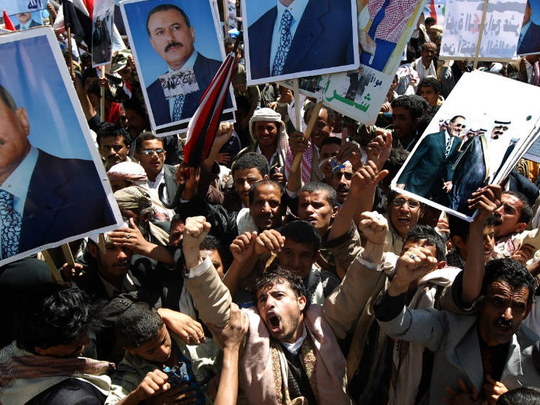
Cairo: Former Yemeni strongman Ali Abdullah Saleh’s death at the hands of his own allies could mark the beginning of the end for the Iranian-backed Al Houthis— as their opponents are hoping, trying to forge a force out of Saleh’s angry supporters to assault the rebel-held capital, Sana’a.
But Al Houthis could gain in the short term after they were able to break ranks of the military units loyal to him, leaving his camp in disarray.
That’s a sign of how complicated the conflict is. The fighting has been deadlocked for more than a year.
Here is a look at Yemen’s power players, what happened and what could happen next.
Al Houthis
Originally a religious movement aimed at reviving Yemen’s Zaidi branch of Shiism, Ansar Allah, the group’s official name, fought a series of wars against Saleh after his army killed its leader, Hussain Badr Al Din Houthi, in 2004. But after Saleh’s fall, he backed Al Houthis and they overran the capital in 2014.
Saudi Arabia and its allies say the group is a proxy for Iran, accusing it of providing weapons and missiles. Al Houthi forces are battle-hardened and have a constant supply of new recruits from their heartland in the north. They have emerged as warlords with a powerful, repressive hold, detaining thousands, imposing heavy taxes and engaging in black market business.
Saleh's camp
During his three decades as president, Saleh built an extensive network of allies among tribes, the military and his political party. His sons and nephews commanded the main military branches. Much of that remained in place after he was forced to resign during Arab Spring protests against his rule 2012 and was replaced by his vice president Abd Rabbo Mansour Hadi.
Hoping to ride Al Houthis back to power, Saleh threw that network behind the rebels.
But they never trusted each other. Al Houthis quietly sucked away Saleh’s strength, winning over his tribal allies, seizing his armories and wooing his military commanders.
Analysts believe the large majority of Saleh’s forces quit and went home or dissolved into Al Houthi ranks. Only a few remained in his camp, particularly the Special Guards unit, part of the Republican Guards once headed by his son Ahmad.
When Saleh turned against Al Houthis, he “made many miscalculations” he thought the street will rise up” the forces will fight with him” the tribes will get together,” one of his former associates, Jamal Ammar, told The Associated Press.
The Saudi-led coalition
The coalition intervened in the war after Hadi’s internationally-recognised government was driven out of the capital and nearly out of the country during an Al Houthi coup.
The coalition succeeded in pushing Al Houthis out of 85 per cent of Yemeni territory, especially in the east and south.
But, Al Houthis still control heavy population centres and their stronghold of Saada in the north. On the ground, the coalition fights with a mix of Yemeni army units loyal to Hadi and southern secessionist militias.
Most of his forces are centered in Marib, east of Sana’a. Hadi has been in self-imposed exile in Riyadh for most of the war. In the south, the UAE has played a critical role in training Yemeni fighters to counter the growing threat of Al Qaida.
What happened in the past days
The Saleh-Houthis alliance has been shaky for months—Saleh resented their domination of power, they suspected he was secretly talking to the coalition.
Last week, outright battles over Sana’a erupted between their forces.
They fought for six days with artillery, heavy machine guns and tanks, trapping Sana’a residents in their homes.
During the fighting, Saleh and Hadi’s government each said they willing to put aside their past enmity and join forces. But on Monday, Al Houthis gunned down Saleh, and by nightfall they retook most of the capital from his forces.
What could happen now?
Al Houthis have sole domination over northern Yemen without their untrustworthy partner.
But they are alone, without the political support Saleh brought them, “stripped of any cover and shown purely as a religious sectarian movement ruling with force and repression,” said Majid Al Madhaji, from the Sana’a Centre for Strategic Studies.
The coalition and Hadi will try to unify the remnants of Saleh’s supporters and forces and rally them against Al Houthis. The forces need a leader, and the most plausible one is Saleh’s son Ahmad, the former Republican Guard commander living in exile.
With Saleh’s forces, Hadi and the coalition could launch a push on Sana’a from the mountain region of Nehm just to the east, backed by escalated air strikes.
They would need the backing of the seven big tribes in the areas surrounding the capital, known as the Collar Tribes, which have stayed neutral during the war, essentially allowing Al Houthi control. They are seen as likely to side with whoever seems stronger.
The plan is that a ground advance on Sana’a, where Al Houthis’ hold has been unquestioned since 2014, could break the stalemate.
“The road to get rid of Houthis is becoming clearer and easier,” Al Madhaji said, calling the end of the Saleh-Al Houthi alliance “a free gift” for the coalition.












